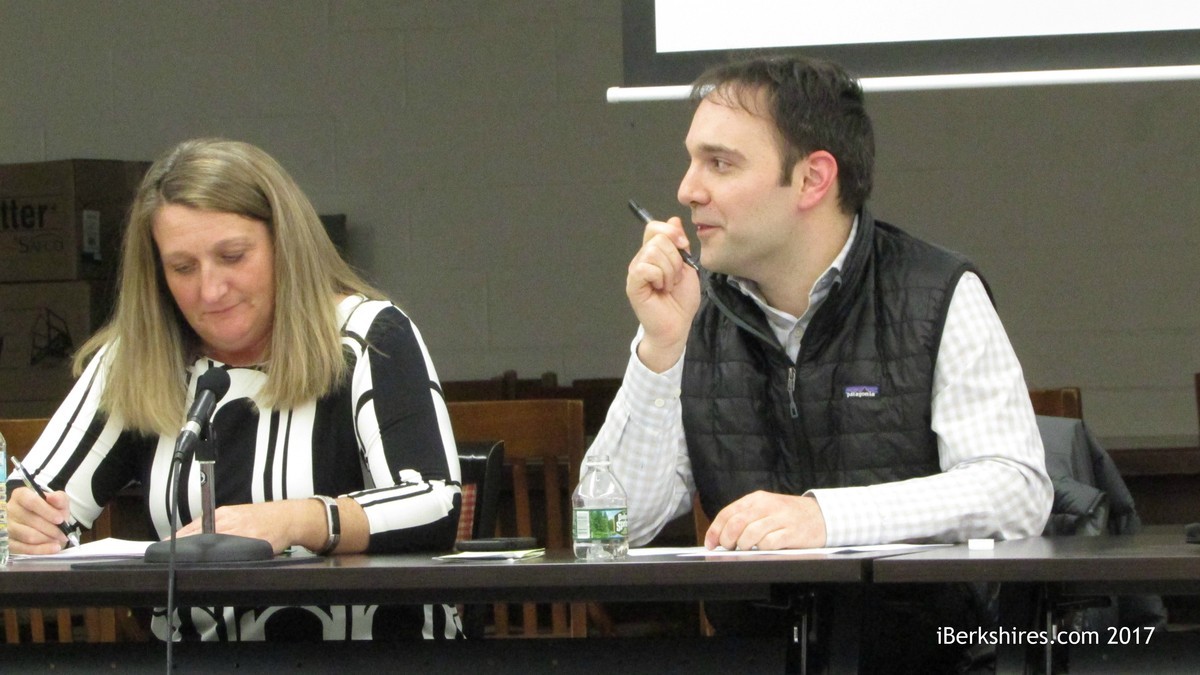Mount Greylock Transition Committee Holds First MeetingBy Stephen Dravis, iBerkshires Staff
04:02AM / Thursday, November 30, 2017 | |
 Interim Superintendent Kimberley Grady opened Tuesday's Transition Committee meeting, where Joe Bergeron was elected chairman. Interim Superintendent Kimberley Grady opened Tuesday's Transition Committee meeting, where Joe Bergeron was elected chairman. |
WILLIAMSTOWN, Mass. — The Transition Committee of the Mount Greylock Regional School District Tuesday discussed the work ahead of it as the two-town district expands to include its two elementary schools.
Tuesday was the first meeting of the group, which does not formally have authority over the three schools — Mount Greylock, Williamstown Elementary and Lanesborough Elementary — until the new regional agreement goes into effect on Jan. 1, 2018.
But the Department of Elementary and Secondary Education in Boston has advised district officials to start meeting and preparing so it can hit the ground running next year.
"Part of what we’re balancing is we have this compressed timeline because we didn't exist until a week ago and don’t really exist until Jan. 1," Joe Bergeron said.
Bergeron, the chairman of the Williamstown Elementary School Committee, is one of two members of that body on the seven-person Transition Committee. On Tuesday, he was elected by his colleagues to chair the Transition Committee, which will govern the PreK-12 district until November 2018, when a new Mount Greylock Regional School Committee is elected.
In addition to electing Bergeron chair and Lanesborough’s Regina DiLego as vice-chair, the committee Tuesday came to an agreement on some of the subcommittee assignments, including one whose work gets underway right away.
"The Negotiation Subcommittee, you need to develop tonight, please," Interim Superintendent Kimberley Grady told the committee.
The negotiation group is charged with bringing union contracts at the three school districts into alignment so that the unified Mount Greylock district will have one contract with each bargaining group —- teachers, paraprofessionals and support staff — by the beginning of the next fiscal year on July 1, 2018.
The committee agreed it made sense to have one member from each of the existing school committees on the negotiation team because each is familiar with the bargaining units in its own building. Chris Dodig (Mount Greylock), DiLego and Dan Caplinger (WES) will serve on the committee.
Grady told the committee that unions will decide their negotiation teams after a Dec. 11 meeting with the Massachusetts Teachers Association.
"The Negotiation Subcommittee can meet prior to Jan. 1, it just can’t sign any contracts," Bergeron joked.
In the meantime, the Transition Committee has its work cut out developing the transition plan required by DESE. Grady told the group the district has received a sample plan from another school district, but it may not be as easy as simply lifting that language and inserting it into Mount Greylock’s plan.
"A regionalization like this one hasn’t occurred in a while, so it’s an old document," Grady said.
The good news is that she continues to be in constant contact with Christine Lynch, the DESE official who has helped advise Mount Greylock officials throughout their path to this month’s regionalization vote.
Among the immediate and pressing concerns for the Transition Committee is the formation of an FY19 district budget.
Chris Desjardins of Auburn’s The Management Solution laid out the budget timeline that the committee will need to follow, much of which was familiar to the seven veterans of the single-district budget process.
One difference at the elementary schools is the increased role of the school councils in the budget building process. Carolyn Greene, a member of the Mount Greylock School Committee who serves on the Transition Committee, noted that the School Council at Mount Greylock has been heavily involved in the budget building process for years.
Bergeron said he wants to encourage the same level of involvement at the two elementary schools and suggested that the existing school committees at each encourage that engagement; the three school committees continue to operate at least through the conclusion of the fiscal year, although all decisions that affect the district beyond June 30 reside with the Transition Committee.
"One of the things we know to be true is we need to, as quickly as possible, empower the school councils and principals to represent their buildings," Bergeron said. "My hope is each of the existing school committees could empower the school councils."
School councils, which include faculty members, staff and community members and are co-chaired by a school’s principal, have a role in the budgeting process that is defined by state law and outlined in the regional agreement ratified by Lanesborough and Williamstown voters.
Grady, who noted that the "game is changing a little bit" at the elementary school level, reminded the committee that all three school councils took part in a training session earlier this year with a representative from the Massachusetts Association of School Committees.
The Transition Committee tentatively set its next meeting for Dec. 12 at 6:30 p.m.
| 
